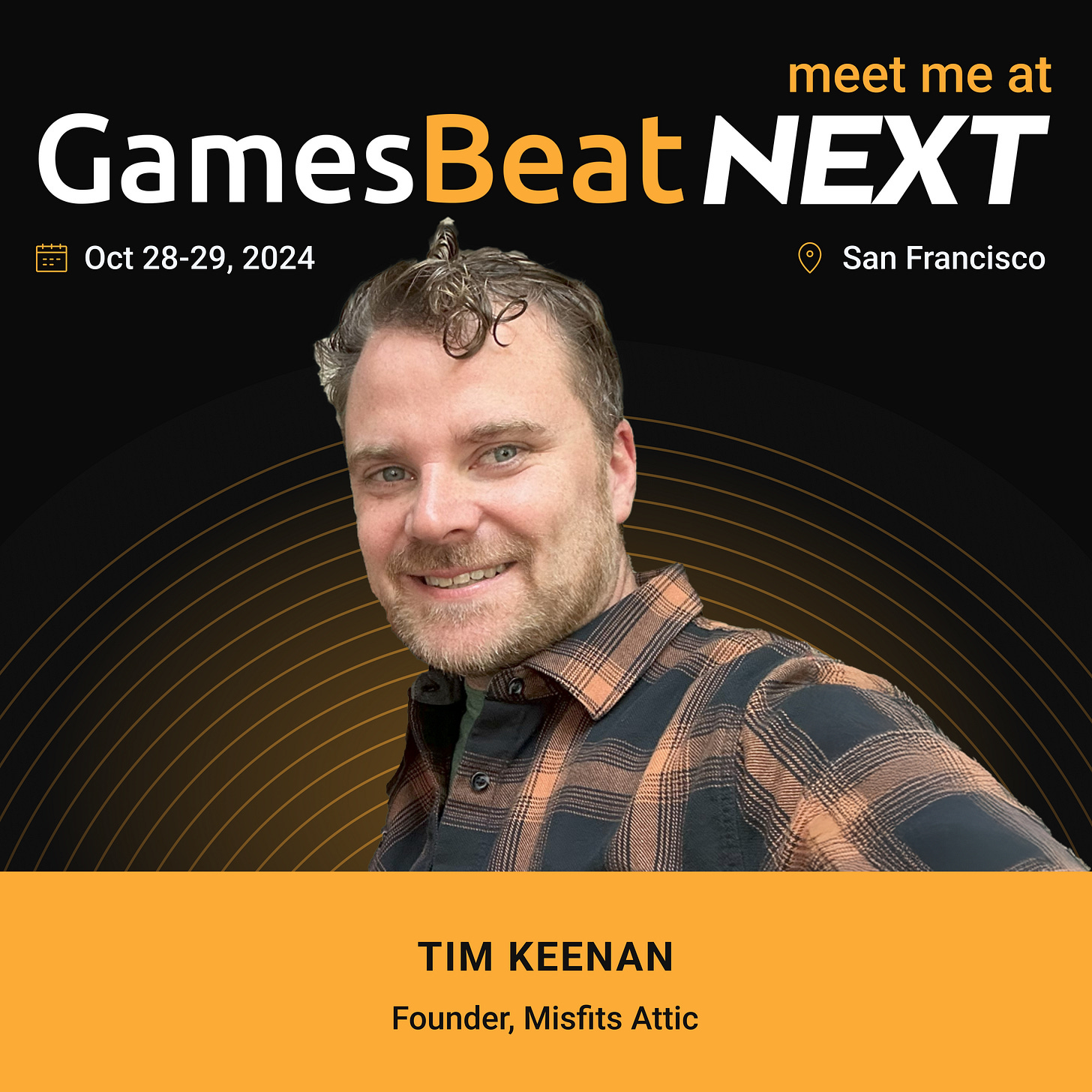Now that Tim Keenan, Creative Director of Misfits Attic, has playable content ready to share with investors and publishers, I thought it was time to tell the full origin story of Elbow Grease Games. (please reach out if you want to see what he’s up to, or find out more about EGG and we’ll be talking at GamesBeat Next on October 28th at 4pm!)
I’ve been an entrepreneur in the gaming industry since 2008 when I joined a group of childhood friends starting Wolfire Games fulltime. While I was there, Wolfire shipped Lugaru HD, Overgrowth and Receiver.
In 2010 I co-founded Humble Bundle with the goal of driving additional sales and goodwill for video games companies big and small. We benefited immensely from the famous startup incubator Y Combinator and were part of the Winter ‘11 batch. YC helped us quickly tune up our company and put us on a fast track towards meeting investors like Sequoia Capital. We were able to close a Series A led by Sequoia Capital. We would spend the next 7 years growing the business until we were successfully acquired by Ziff Davis. I left in 2019 after fulfilling my earn-out obligations. This whole journey was not easy but would have been so much harder without the investment and guidance from YC and Sequoia and our angel investors.
I love small companies and entrepreneurs. After completing a successful venture cycle for myself, I wanted to pay it forward. So I became an angel investor in tech for a few years. I invested in dozens of tech companies (like Short Story, Handle and Arist etc.) thanks to the Y Combinator ecosystem and their Simple Agreement for Future Equity (SAFE). However, I noticed that no such ecosystem really existed for video games. In general video game companies don’t get as much love from VC’s as tech companies.
Meanwhile early-stage game funding becomes challenging
Over the years the biggest innovations I had seen in early video game funding were: Kickstarter, Indie Fund (started by indie devs for indie devs where I’ve been a member since 2013), Valve’s adoption of Early Access onto Steam and the rise of the indie game publisher.
Indie Fund can be used early-stage but comes with the disadvantage of being a finishing-fund in structure ie it has a 100% royalty recoup phase. So, once you sign with Indie Fund you are agreeing to ship with the funding they give you… or you need to find a publisher willing to buy out the Indie Fund before entering into a publishing contract. So all said and done, Indie Fund is mostly designed to be a finishing fund or project fund.
Kickstarter and Early Access, when conducted early in the dev cycle, come with the disadvantage of announcing and de-stealthing your game to your audience before you’ve fully de-risked all your game loops. Similar to trying to sign a publisher early in your dev cycle, you end up under pressure to commit to features and milestones that you haven’t 100% vetted. The more you promise, the better your Kickstarter is likely to go but the greater the risk of adding scope that you can’t afford or that isn’t actually fun.
Indie publishers take on a lot of risk when they offer money up front to help ship a game. The only way they can de-risk is by waiting until you have a playable or vertical slice that convinces them your game will be awesome. This is how we operated Humble Publishing when we launched it. We always needed to see a solid playable before signing. But this is not helpful if you need super-early funding.
Tim Keenan returns to Misfits Attic
I had been considering these realities while pondering how I might rejoin the industry when in 2021 I saw Tim Keenan do a Reddit AMA.
Tim is someone I have known for over a decade. Not only had we worked together on Humble Bundle promotions for his studio, but as a member of Indie Fund, I had helped fund his game Duskers. Duskers won over 20 awards and was profitable for Tim and Indie Fund investors like me. Duskers continues to be a darling indie game to this day. Some gamers call it the scariest game on pc.
After Duskers’ success, Tim had gone to work with JJ Abrams at Bad Robot to expand them beyond TV and film into video games. But after a few years there, he had decided that his true passion was to return to focusing on his own studio.
I called Tim right away and insisted we grab lunch. Tim recalls me saying “OK so Tim… what are we doing? What do you need?”. Tim had replied “Prototype funding… I’m looking for prototype funding.” We combined networks and over the coming months had 40 or so conversations with investors and publishers… but none seemed to actually be doing any prototype funding.
Equity-based prototype funding
I decided that I would personally prototype fund Tim. The only question was: how? Tim and I were so concerned about doing what was right for one another, that we each ended up negotiating against ourselves and things got complicated. We were thinking about royalties then equity then some kind of combo. But to support a studio without forcing them to pre-define what they want to make, and also do no harm to their future funding opportunities… the only option is equity funding.
With equity, you invest in the studio and go on a “ride or die” journey with the founders as they iterate to find the fun. You don’t know precisely what they will produce but you place a bet on the founding team and they can sign with you and still add more investors and/or sign with a publisher.
Again, I recalled how Humble Bundle had been the beneficiary of Y Combinator’s early-stage equity funding. YC had already solved this problem. Why not keep it simple and use their Simple Agreement for Future Equity?
So we did: on May 20th, 2022, Tim and I agreed to sign a SAFE. Misfits Attic became EGG’s first Prototype Funding investment.
Great minds think alike
I started talking to friends and colleagues of mine to get their opinion of EGG’s model. Turns out, several people in my network agreed the model was prescient and and wanted to invest in EGG. EGG has now scaled up to help nine companies and counting. (I’ll talk more about them in future posts.)
A16Z has since used SAFEs in a similar manner to address this under-served part of the ecosystem via their Speedrun initiative.
As I orbit the international conference circuit to talk about EGG and show off EGG portfolio companies, I continue to encounter more and more angel investors popping up in the games industry.
I am convinced more than ever that this style of investment will continue to gather momentum. I think Tim and I were early in heading in the right direction: Equity-based prototype funding addresses the vacuum forming in the game funding market while empowering studios to do the vigorous iterative prototyping needed to de-risk their development. It will lead to innovation and prosperity for the future of the gaming industry. I will expand on this in future posts but for now…
Tim and I are going to be speaking together at GamesBeat NEXT later this month to talk about these ideas and more and hopefully answer lots of questions from the audience. If you want to check it out, here’s the info:
Subject: Studio funding should be more like startup funding
https://gamesbeatnext.com/
October 28, 2024
4:00 – 5:00 PM
Landmark Library
Thank you to: Tim Keenan and Callum Underwood for editing.






Note: I've been informed our talk has been moved to 4-5pm on October 28th. This is now updated.
(it was listed as 2:50-3:50pm previously)